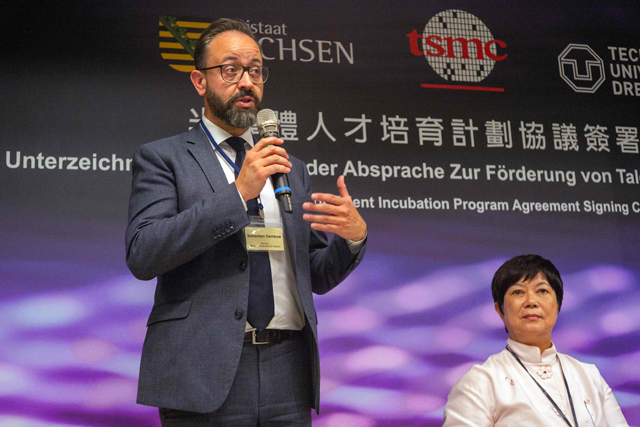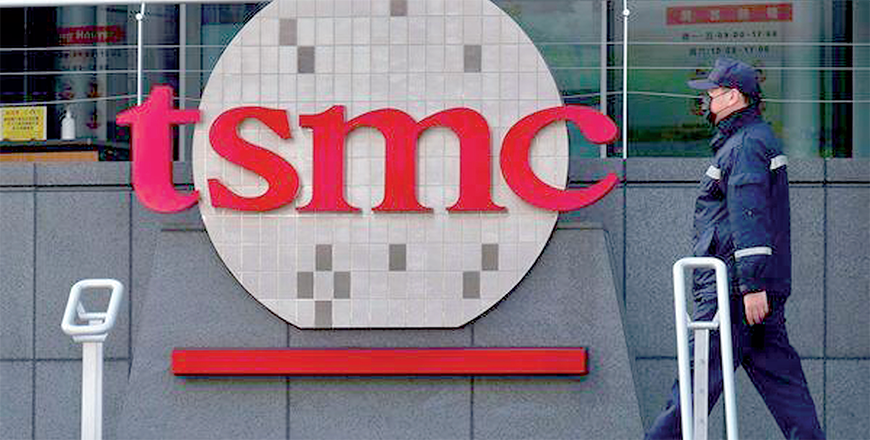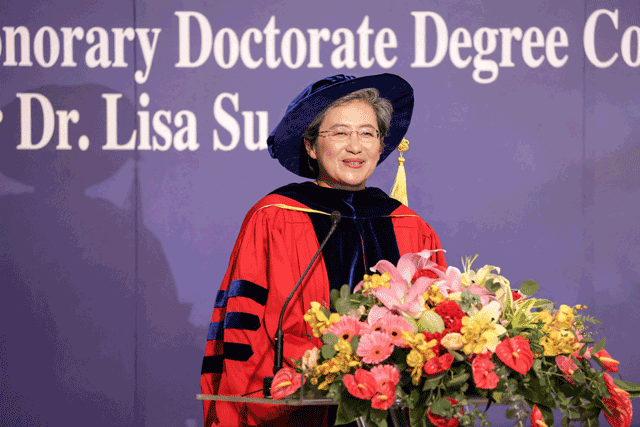You are here
Taiwan's TSMC to help train German students for semiconductor careers
By AFP - Sep 19,2023 - Last updated at Sep 19,2023

Sebastian Gemkow, minister of Germany’s Saxon State Ministry of Science speaks next to Lora Ho, senior vice president of human resources of Taiwan Semiconductor Manufacturing Company (TSMC), during a semiconductor talent incubation programme agreement signing ceremony in Taichung on Tuesday (AFP photo)
TAICHUNG — Germany's Saxony state signed an agreement with Taiwanese chip giant TSMC on Tuesday to train German students in an effort to meet the growing demand for workers in the semiconductor sector.
A shortage of skilled workers including in the crucial chip sector has emerged as a major challenge for Germany, Europe's largest economy, as vast cohorts of older employees retire.
Last month, the Taiwan Semiconductor Manufacturing Company — which controls more than half of the world's chip output — announced a new $3.8 billion chip factory in Saxony's capital Dresden.
The agreement, signed between TSMC, Saxony and the Dresden University of Technology (TU Dresden) "is specifically designed to train German STEM students for careers in the semiconductor industry", the Taiwanese firm said in a statement.
Up to 100 high-achieving students from the state will come to Taiwan for a six-month exchange programme and "collaborate with Taiwan's top universities", it added.
The first students are expected in February 2024, according to TSMC.
Market research has shown a demand for more than 1 million skilled workers in the chip industry, said Lora Ho, TSMC's senior vice president of human resources.
"We are preparing in advance for the shortage of talents that may come shortly and strengthening semiconductor education is the most critical way to resolve the global shortage of technical talents."
Construction of TSMC's Dresden facility, which will be focused on automotive chips, is scheduled to begin next year, with production starting by the end of 2027.
It is expected to create around 2,000 direct high-tech jobs.
"We know companies from the semiconductor field [are] facing problems with finding enough talents," Sebastian Gemkow, Saxony's State Minister for Science, told AFP.
"That's why we started very early to structure this process so TSMC and later ESMC will have all the employees that it needs," he said, referring to the European Semiconductor Manufacturing Company.
ESMC is a joint venture between TSMC, Germany's Bosch and Infineon, and Dutch firm NXP that will build the Dresden plant.
TSMC's production has expanded beyond Taiwan as Western powers lines have raised concerns about the chip industry — critical for the modern global economy — being centred on an island that China claims as its territory.
Beijing has ramped up political and military pressure on the island in recent years, adding to fears about the global semiconductor supply chain.
Related Articles
TAIPEI — Taiwan's chip giant TSMC said Thursday it did not expect any direct effect on production from China's latest export controls on two
WASHINGTON — The Taiwan chip giant TSMC has agreed to build a third semiconductor factory in Arizona, raising its total investment in the Un
HSINCHU — AI will be the "defining mega-trend" for the global computing industry, the head of chip giant AMD said on Thursday in Taiwan, whe
















